Key takeaways:
- Vulnerability in performance fosters deeper connections and authenticity between the artist and the audience.
- Sharing personal stories and imperfections during performances transforms music into a relatable experience, evoking empathy and support.
- Overcoming the fear of judgment allows artists to embrace their flaws, resulting in memorable moments and stronger audience bonds.
- Preparation and engaging with the audience can significantly boost an artist’s confidence, turning anxiety into enthusiasm.
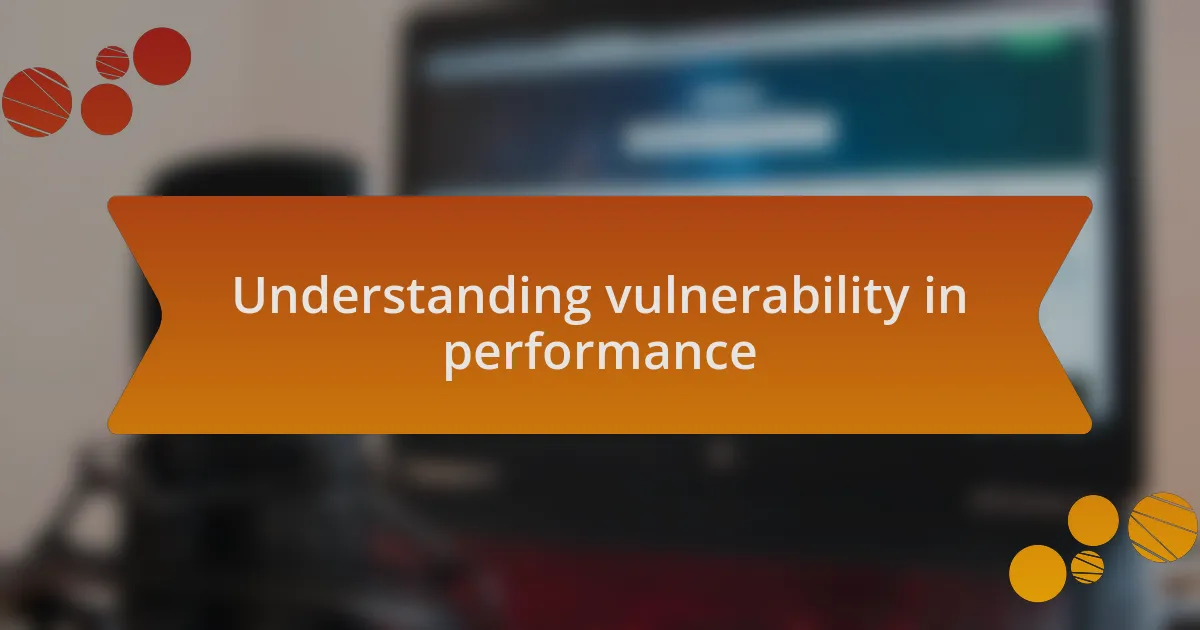
Understanding vulnerability in performance
Vulnerability in performance is a surprisingly powerful tool. I remember the first time I stepped on stage, nerves coursing through me like electricity. The moment I allowed myself to feel those nerves instead of masking them, I found an unexpected strength in sharing my authentic self. Isn’t it interesting how the things that make us feel most exposed can also connect us deeper to our audience?
When I explore vulnerable moments in my sets, I often notice how the energy shifts in the room. There’s something magical about sharing my fears or passions that resonates with others. This shared experience creates a bond, turning a solo performance into a collective journey. Have you ever felt that connection in a crowd, as if everyone is sharing a secret?
Understanding vulnerability means recognizing that it’s not a weakness but rather a source of empowerment. I’ve learned that when I embrace my imperfections, I often receive the most heartfelt responses from the audience. It’s a reminder that we’re all in this together, grappling with our own insecurities and striving for moments of authenticity. What if the key to memorable performances lies not in perfection, but in the beauty of our raw, unfiltered selves?
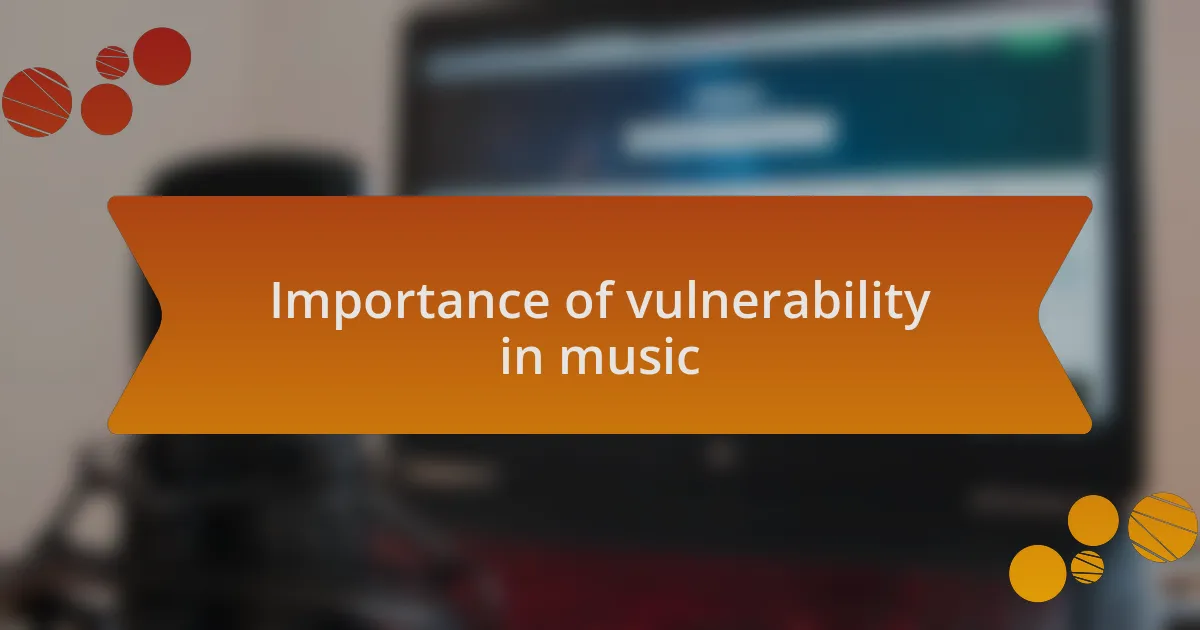
Importance of vulnerability in music
The role of vulnerability in music is pivotal; it allows artists to connect with their audience on a deeper level. I recall a night where a sudden wave of emotion hit me mid-performance, and I chose to share a personal story about my struggles with self-doubt. The audience responded with an overwhelming sense of empathy, showing me that revealing our insecurities can evoke shared emotions and cultivate a supportive atmosphere.
When I embrace vulnerability, the music transforms into a form of storytelling. One memorable performance had me singing a heartfelt ballad about loss, and I genuinely felt my heart open up on stage. The intimate silence that followed spoke volumes; it’s as if time stood still, allowing everyone to feel the weight of that moment together. Have you ever experienced a song so raw that it felt like the artist was pulling back the curtain on their soul?
Ultimately, vulnerability in music fosters authenticity, encouraging artists to be true to themselves. I’ve discovered that when I let go of the need to appear flawless, my performances become more genuine. The joy of creating art lies in its imperfections, inviting the audience to accept their own flaws as well. Isn’t it fascinating how our shared humanity shines brightest through moments of vulnerability?
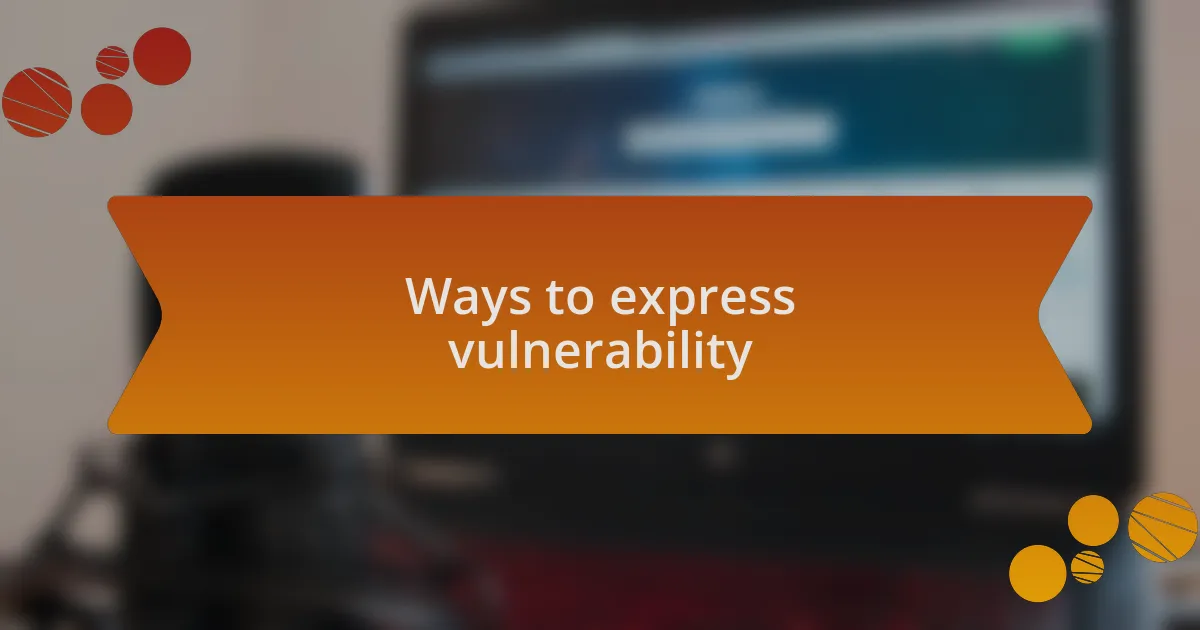
Ways to express vulnerability
One powerful way to express vulnerability is through storytelling in your lyrics or stage banter. I remember performing a track where I shared a moment when music felt like my only escape. As I recounted my journey, I could see heads nodding and eyes glistening with understanding throughout the crowd. Isn’t it incredible how a shared experience can make us feel less alone?
Another approach is to embrace the rawness of live performance itself. I once decided to perform a song I had just written, imperfections and all. I stumbled through a few lines, and rather than shying away from it, I laughed and made a joke about my nerves. The audience erupted in laughter too; we shared a glimpse of authenticity that created an unforgettable connection. Have you ever felt that bond when an artist embraces their flawed humanity?
Lastly, using body language can be a significant tool in expressing vulnerability. I vividly remember standing center stage, my hands trembling as I bared my soul through a stripped-down rendition of a poignant ballad. I allowed myself to make eye contact with audience members, showing my fears and hopes without words. It’s amazing how much can be conveyed in a moment of stillness. How often do you notice the power of silence when vulnerability fills the air?
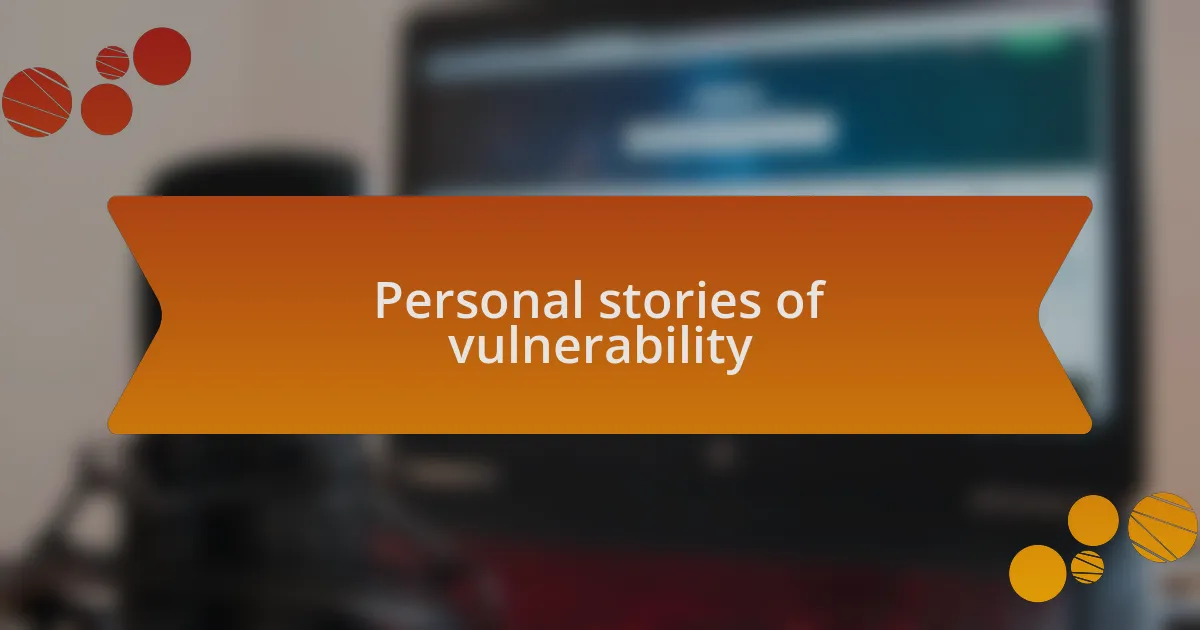
Personal stories of vulnerability
Opening up on stage can be both exhilarating and nerve-wracking. There was a night when I decided to share a deeply personal story about overcoming anxiety before a performance. As I spoke, I noticed a hush fall over the crowd. People leaned in, and I could see some nodding, a reassurance that my truth resonated with their own experiences. Have you ever felt that powerful connection when you dare to bare your soul in front of others?
One time, I performed at a venue where the atmosphere felt electric yet personal. I introduced a song about loss, pausing to let my emotions wash over me. As I shared my memories and tears threatened to fall, I could feel the audience holding their breath, mirroring my vulnerability. It was a shared moment that transcended music, reminding me of the profound way we can support one another through shared pain. Doesn’t it feel comforting when you realize you’re not alone in your struggles?
Reflecting on these experiences, I realize that vulnerability opens doors to genuine connection. During a show, I awkwardly admitted to forgetting my lyrics, and instead of panicking, I invited the audience to sing along. Their laughter and voices filled the space, transforming what could have been a cringe-worthy moment into a heartfelt shared experience. Have you had moments like that, where embracing vulnerability led to unexpected joy?
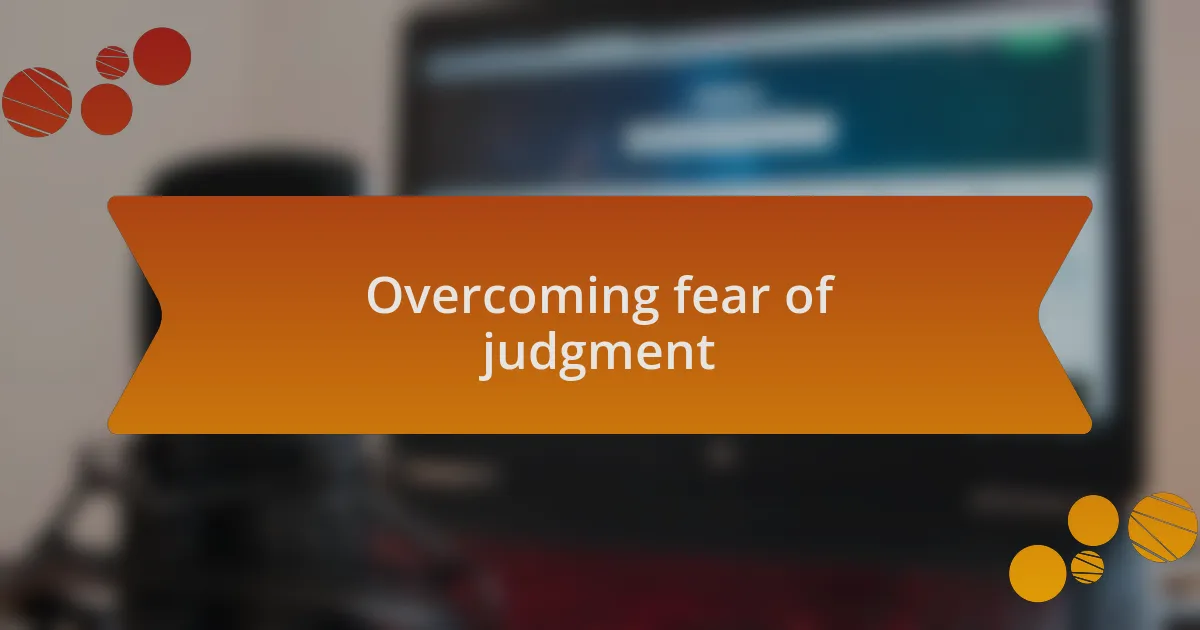
Overcoming fear of judgment
Stepping onto the stage, I often grapple with the fear of judgment, but I’ve learned to view it as an opportunity rather than a threat. I remember one performance where I felt the eyes of the crowd weighing heavily on me, but instead of retreating into self-doubt, I decided to share a faltering note. What amazed me was the way the audience erupted into applause – it was as if my honesty had disarmed their expectations. Have you ever experienced that moment where vulnerability shifted the atmosphere?
There have been times when I’ve stood in front of a crowd, my heart racing with the anticipation of judgment, only to find a way to let my guard down. One night, I slipped and made a silly joke about my clumsiness, eliciting laughter. The atmosphere transformed instantly. I realized that humor can bridge the gap between fear and connection, allowing both me and the audience to embrace our imperfections. Don’t you think moments of lightness can create a powerful bond in an otherwise tense environment?
Facing that fear of judgment means accepting that not everyone will resonate with my performance or story. I recall a time when I shared a heartfelt experience about my struggles with mental health. While some might have had their defenses up, the majority leaned in closer, showing support through their attentive silence and nods. It reminded me that authenticity is often met with understanding, and I wonder: isn’t it liberating to embrace our flaws and find community in shared vulnerabilities?
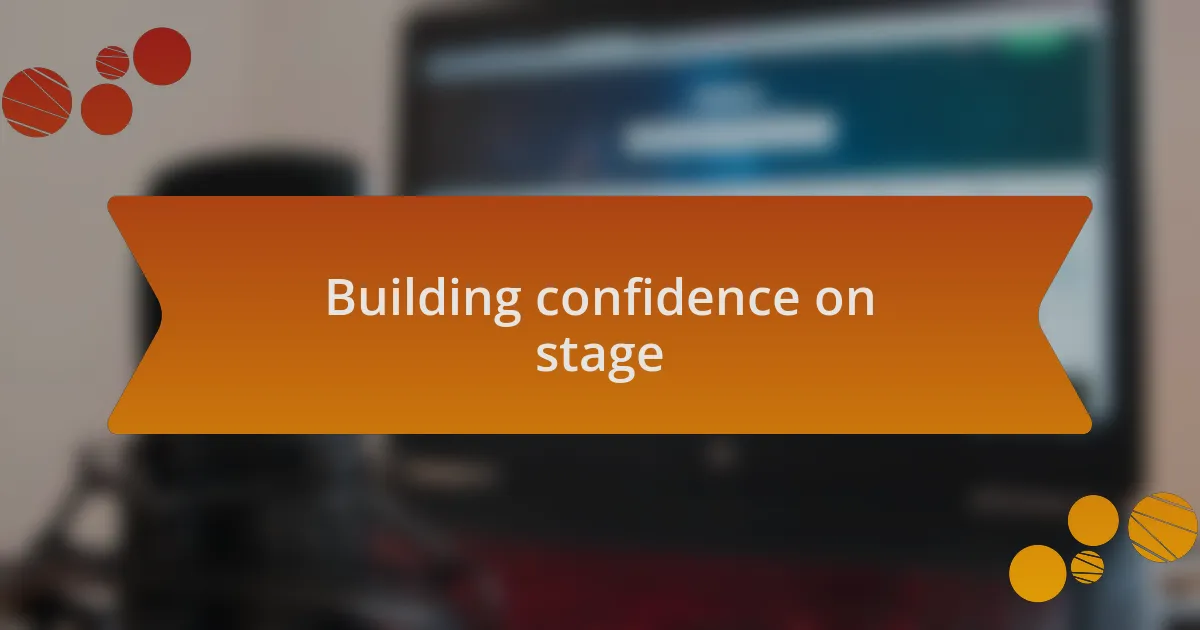
Building confidence on stage
Building confidence on stage often starts with a small step outside of one’s comfort zone. I remember during one of my early gigs, I introduced myself to the audience in a way I’d never done before—sharing a quirky story about my journey to the microphone. That unexpected opening not only eased my own nerves but created an instant connection, transforming my anxiety into enthusiasm. Have you ever noticed how breaking the ice can turn the whole performance around?
As I continued to perform, I discovered that preparation played a huge role in my confidence. Each rehearsal felt like layering armor—when I was well-prepared, the stage lights no longer felt like a spotlight on my insecurities. Instead, they illuminated the joy of sharing my art. It made me wonder: isn’t it fascinating how preparation can shift our perspective on stage presence from fear to a thrilling form of self-expression?
I’ve realized that inviting the audience into my experience can also be a powerful confidence booster. During one show, I paused to ask for stories from the crowd, inviting them to share their own moments of vulnerability. That exchange felt like a warm embrace, reminding me that I wasn’t alone up there. It’s interesting, isn’t it? How the act of engaging with others not only builds our confidence but also creates a shared space where everyone feels valued and heard.